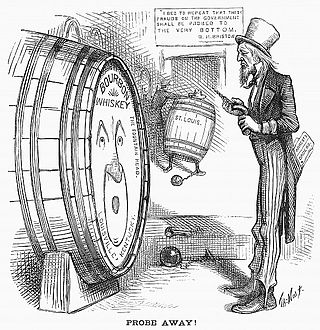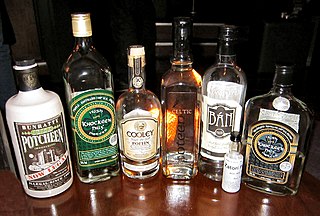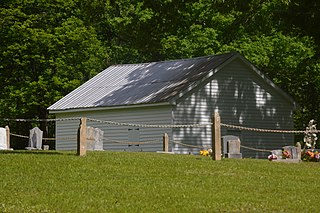Related Research Articles

Canadian whisky is a type of whisky produced in Canada. Most Canadian whiskies are blended multi-grain liquors containing a large percentage of corn spirits, and are typically lighter and smoother than other whisky styles. When Canadian distillers began adding small amounts of highly-flavourful rye grain to their mashes, people began demanding this new rye-flavoured whisky, referring to it simply as "rye". Today, as for the past two centuries, the terms "rye whisky" and "Canadian whisky" are used interchangeably in Canada and refer to exactly the same product, which generally is made with only a small amount of rye grain.

Whisky or whiskey (IPA: /wɪskiː/ is a type of liquor made from fermented grain mash. Various grains are used for different varieties, including barley, corn, rye, and wheat. Whisky is typically aged in wooden casks, which are typically made of charred white oak. Uncharred white oak casks previously used for the aging of port, rum or sherry are also sometimes used.

Bourbon whiskey is a barrel-aged American whiskey made primarily from corn (maize). The name derives from the French House of Bourbon, although the precise source of inspiration is uncertain; contenders include Bourbon County, Kentucky, and Bourbon Street in New Orleans, both of which are named after the House of Bourbon. The name bourbon might not have been used until the 1850s, and the association with Bourbon County was not evident until the 1870s.

Franklin County is a county located in the Blue Ridge foothills of the Commonwealth of Virginia. As of the 2020 census, the population was 54,477. Its county seat is Rocky Mount. Franklin County is part of the Roanoke Metropolitan Statistical Area and is located in the Roanoke Region of Virginia. The Roanoke River forms its northeast boundary with Bedford County.

Moonshine is high-proof liquor, traditionally made or distributed illegally. The name was derived from a tradition of distilling the alcohol at night to avoid detection. In the first decades of the 21st century, commercial distilleries have adopted the term for its outlaw cachet and have begun producing their own legal "moonshine", including many novelty flavored varieties, that are said to continue the tradition by using a similar method and/or locale of production.

Rocky Mount is a town in and the county seat of Franklin County, Virginia, United States. The town is part of the Roanoke Metropolitan Statistical Area, and had a population of 4,903 as of the 2020 census. It is located in the Roanoke Region of Virginia.

Tennessee whiskey is straight whiskey produced in the U.S. state of Tennessee. Although it has been legally defined as a bourbon whiskey in some international trade agreements, most current producers of Tennessee whiskey disclaim references to their products as "bourbon" and do not label them as such on any of their bottles or advertising materials. All current Tennessee whiskey producers are required by Tennessee law to produce their whiskeys in Tennessee and – with the sole exception of Benjamin Prichard's – to use a filtering step known as the Lincoln County Process prior to aging the whiskey. Beyond the perceived marketing value of the distinction, Tennessee whiskey and bourbon have almost identical requirements, and most Tennessee whiskeys meet the criteria for bourbon.

The Whiskey Ring took place from 1871 to 1876 centering in St. Louis during the presidency of Ulysses S. Grant. The ring was an American scandal, broken in May 1875, involving the diversion of tax revenues in a conspiracy among government agents, politicians, whiskey distillers, and distributors. Whiskey distillers bribed officials from the U. S. Department of the Treasury to increase profits and evade taxes. Grant's Justice Department prosecuted members of Grant's own Republican Party who were part of the Ring. The kingpin of the Whiskey Ring was the notorious General John McDonald, whom Grant had appointed Revenue Collector of Missouri District in 1869. Under the leadership of Grant's Secretary of Treasury, Benjamin Bristow, a reformer, the Ring was uncovered and broken up.
The Gainesville Eight were a group of anti-Vietnam War activists indicted on charges of conspiracy to disrupt the 1972 Republican National Convention in Miami Beach, Florida. All eight defendants were acquitted.
Conecuh Ridge Whiskey was rebranded as Clyde May's Whiskey in 2017. It is a high-quality, high-proof, aged whiskey that is available as an Alabama-style whiskey, Straight Bourbon and Straight Rye whisky. Originally it was produced illegally in Alabama during the mid to late 20th century by Clyde May but the brand was legalized by Clyde's son, Kenny May in 2001.

Rum-running, or bootlegging, is the illegal business of smuggling alcoholic beverages where such transportation is forbidden by law. The term rum-running is more commonly applied to smuggling over water; bootlegging is applied to smuggling over land.

Poitín, anglicized as poteen or potcheen, is a traditional Irish distilled beverage. Former common names for Poitín were "Irish moonshine" and "mountain dew". It was traditionally distilled in a small pot still and the term is a diminutive of the Irish word pota, meaning "pot". In accordance with the Irish Poteen/Irish Poitín technical file, it can be made only from cereals, grain, whey, sugar beet, molasses and potatoes.

Roy Olmstead was one of the most successful and best-known bootleggers in the Pacific Northwest region during American Prohibition. A former lieutenant in the Seattle Police Department, he began smuggling alcohol from Canada while still on the force. Following his arrest for that crime, he lost his job in law enforcement and turned to illegally importing and distributing alcohol as a full-time and highly profitable occupation. Eventually, wiretaps of his phones provided sufficient evidence for his arrest and prosecution, despite an appeal that reached the Supreme Court regarding the legality of the wiretap.

John Paul Jr. was Virginia lawyer and farmer who served in the Virginia Senate and United States House of Representatives, before becoming a United States district judge of the United States District Court for the Western District of Virginia, and serving as Chief Judge during the Byrd Organization's Massive Resistance to the U.S. Supreme Court's decisions in Brown v. Board of Education.

Marvin "Popcorn" Sutton was an American Appalachian moonshiner and bootlegger. Born in Maggie Valley, North Carolina, he grew up, lived and died in the rural areas around Maggie Valley and nearby Cocke County, Tennessee. He wrote a self-published autobiographical guide to moonshining production, self-produced a home video depicting his moonshining activities, was the subject of several documentaries, including one that received a Regional Emmy Award, and is the subject of the award-winning biography and photobook The Moonshiner Popcorn Sutton.

Moonshiners is an American docudrama television series on the Discovery Channel produced by Magilla Entertainment that dramatizes the life of people who produce (illegal) moonshine in the Appalachian Mountains of Kentucky, North Carolina, South Carolina, Tennessee, and Virginia. The series dramatizes their liquor production efforts, law-evading techniques and life. There have been claims by local officials that the show is not what it portrays itself to be. Virginia authorities have stated that no illegal liquor is actually being produced by the people depicted in the show. The Virginia Department of Alcoholic Beverage Control (ABC) said in March 2012 that, "If illegal activity was actually taking place, the Virginia ABC Bureau of Law Enforcement would have taken action." They also said that they had requested for the producer to add a disclaimer to clarify that the show was only a dramatization, "but the request was overlooked", and the show's producer, Magilla Entertainment, have stated its documentary content is real.

The Wettest County in the World is a 2008 historical novel by Matt Bondurant, an American writer who features his grandfather Jack and grand-uncles Forrest and Howard as the main characters in the novel.

The Old Chapel Church, also known locally as the "Snow Creek Chapel", was built in 1769 as a chapel of ease for the Church of England parish in what is today Penhook, Virginia, United States.
Willie Carter Sharpe was a rum runner in Virginia during the prohibition of alcohol.
References
- 1 2 "Moonshining Reputation Built on Long History". The Franklin News Post. October 10, 2007. Retrieved October 6, 2014.
- ↑ William B. Hopkins, Another View of the Great Moonshine Conspiracy Trial of 1935, VBA News Journal, p. 19 (Winter 2009/2010).
- ↑ Thompson, Charles D. (April 2011). Spirits of Just Men : Mountaineers, Liquor Bosses, and Lawmen in the Moonshine Capital of the World. The University of Illinois Press. pp. 7–15.
- ↑ William B. Hopkins, Another View of the Great Moonshine Conspiracy Trial of 1935, VBA News Journal, p. 20 (Winter 2009/2010).
- ↑ Writer, David M. Poole Staff. "Mystery of 1935 moonshine conspiracy continues". Roanoke Times. Retrieved 2020-01-23.